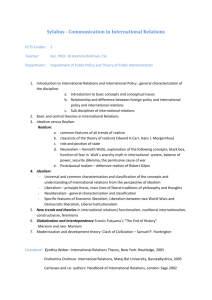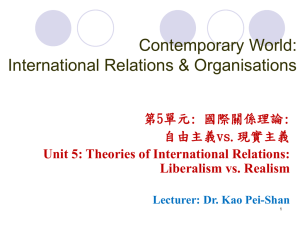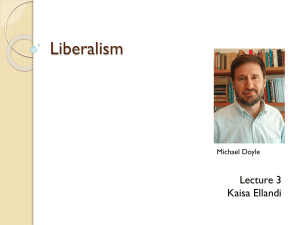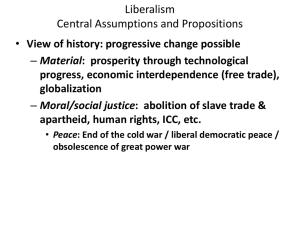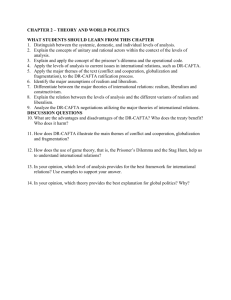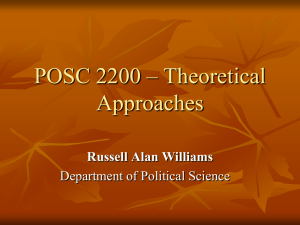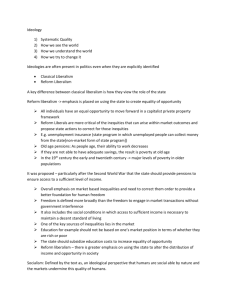15 LIBERALISM AND REALISM: A MATRIX FOR POLITICAL
advertisement
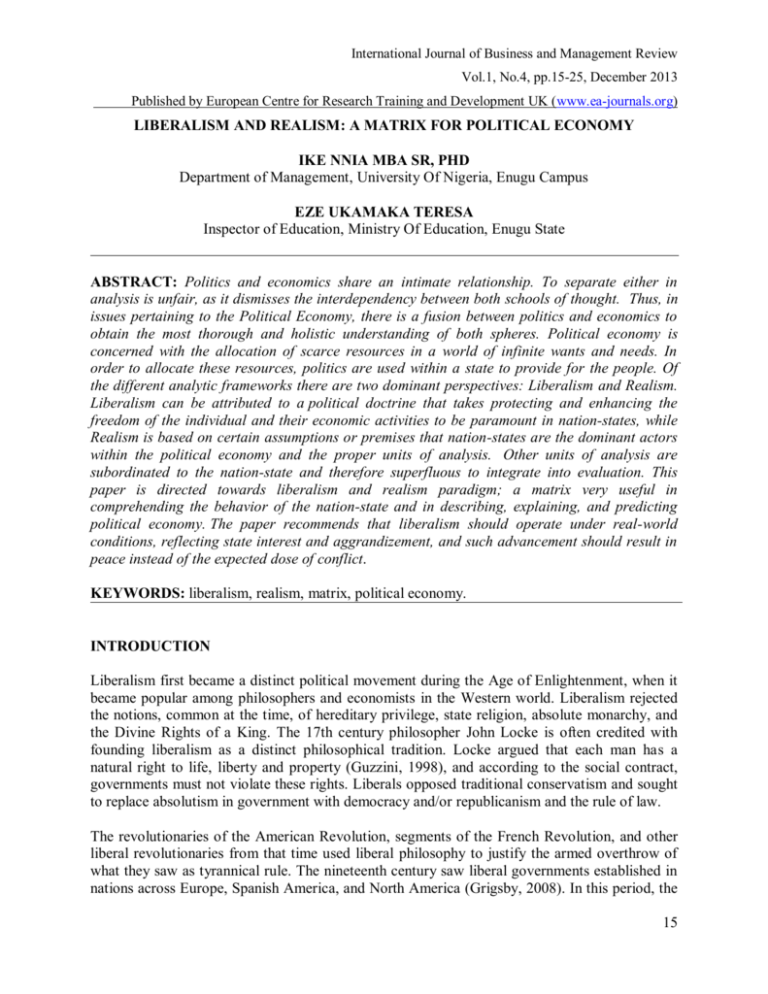
International Journal of Business and Management Review Vol.1, No.4, pp.15-25, December 2013 Published by European Centre for Research Training and Development UK (www.ea-journals.org) LIBERALISM AND REALISM: A MATRIX FOR POLITICAL ECONOMY IKE NNIA MBA SR, PHD Department of Management, University Of Nigeria, Enugu Campus EZE UKAMAKA TERESA Inspector of Education, Ministry Of Education, Enugu State ABSTRACT: Politics and economics share an intimate relationship. To separate either in analysis is unfair, as it dismisses the interdependency between both schools of thought. Thus, in issues pertaining to the Political Economy, there is a fusion between politics and economics to obtain the most thorough and holistic understanding of both spheres. Political economy is concerned with the allocation of scarce resources in a world of infinite wants and needs. In order to allocate these resources, politics are used within a state to provide for the people. Of the different analytic frameworks there are two dominant perspectives: Liberalism and Realism. Liberalism can be attributed to a political doctrine that takes protecting and enhancing the freedom of the individual and their economic activities to be paramount in nation-states, while Realism is based on certain assumptions or premises that nation-states are the dominant actors within the political economy and the proper units of analysis. Other units of analysis are subordinated to the nation-state and therefore superfluous to integrate into evaluation. This paper is directed towards liberalism and realism paradigm; a matrix very useful in comprehending the behavior of the nation-state and in describing, explaining, and predicting political economy. The paper recommends that liberalism should operate under real-world conditions, reflecting state interest and aggrandizement, and such advancement should result in peace instead of the expected dose of conflict. KEYWORDS: liberalism, realism, matrix, political economy. INTRODUCTION Liberalism first became a distinct political movement during the Age of Enlightenment, when it became popular among philosophers and economists in the Western world. Liberalism rejected the notions, common at the time, of hereditary privilege, state religion, absolute monarchy, and the Divine Rights of a King. The 17th century philosopher John Locke is often credited with founding liberalism as a distinct philosophical tradition. Locke argued that each man has a natural right to life, liberty and property (Guzzini, 1998), and according to the social contract, governments must not violate these rights. Liberals opposed traditional conservatism and sought to replace absolutism in government with democracy and/or republicanism and the rule of law. The revolutionaries of the American Revolution, segments of the French Revolution, and other liberal revolutionaries from that time used liberal philosophy to justify the armed overthrow of what they saw as tyrannical rule. The nineteenth century saw liberal governments established in nations across Europe, Spanish America, and North America (Grigsby, 2008). In this period, the 15 International Journal of Business and Management Review Vol.1, No.4, pp.15-25, December 2013 Published by European Centre for Research Training and Development UK (www.ea-journals.org) dominant ideological opponent of liberalism was classical conservatism. During the twentieth century, liberal ideas spread even further, as liberal democracies found themselves on the winning side in both world wars. Liberalism also survived major ideological challenges from new opponents, such as fascism and communism. In Europe and North America, there was also the rise of social liberalism (Dorrien, 2001), which is commonly identified with the liberal socialism and social democracy in Europe (Manor, 1999). The meaning of the word "liberalism" also began to diverge in different parts of the world. In the United States, liberalism is associated with the welfare-state policies of the New Deal program of the Democratic administration of former Pres. Franklin D. Roosevelt, whereas in Europe it is more commonly associated with a commitment to limited government and laissez-faire economic policies, while in Africa it is regarded as a salvation from colonialism and practice of democracy (Leman, 2001). Consequently in America, the ideas of individualism and laissez-faire economics previously associated with classical liberalism became the basis for the emerging school of libertarian thought (Diamond, 2008). Today, liberal political parties remain a political force with varying degrees of power and influence on all inhabited continents unlike their realism counterparts. Realism is a view of international politics that stresses its competitive and conflictual side. It is usually contrasted with idealism or liberalism, which tends to emphasize cooperation. Realists consider the principal actors in the international arena to be states, which are concerned with their own security, act in pursuit of their own national interests, and struggle for power (Aaron, 2006). The negative side of the realists' emphasis on power and self-interest is often their skepticism regarding the relevance of ethical norms to relations among states. National politics is the realm of authority and law, whereas international politics, they sometimes claim, is a sphere without justice, characterized by active or potential conflict among states (Ashley, 2004). There are innumerable scenarios that can be evaluated with Realism. Technological and military development is an obvious corollary to a nation-state’s desire for increased national security, as well as the ability to control; hence the United States allocates huge funding into its advanced economy and military expenditures (Leman, 2001). This coincides with industrialization, which sets the stage for self sustainability and military prosperity. Moreover, growth and maintaining the agriculture sector, as in Japan, is also interpreted as a movement towards power, as it allows for self sustainability and thus political independence. Realism evidently can account for much of domestic policy, and foreign affairs are little different. In the 1860s, Japan was humiliated when the United States sent an envoy of ships into their bay, and forced Japan to open its markets at the threat of attack (Guzzini, 1998). This was beneficial for America but not Japan. Other examples of nation-states’ abuse of power for their own interests are impositions of agreements like North American Free Trade Agreement (NAFTA) and other similar agreements forced onto developing countries by the international financial institutions such as the International Monetary Fund (IMF) and World Bank, which favor the dominant, more powerful, state. The United States and Britain attacked Iraqi in 1991 having accused them of possessing weapons of mass destruction. Currently, the United States and one of her key allies; France, are threatening to attach Syria on accusation that they used chemical weapons on civilians in the ongoing war between the Syrian government and Hezbollah rebel forces. 16 International Journal of Business and Management Review Vol.1, No.4, pp.15-25, December 2013 Published by European Centre for Research Training and Development UK (www.ea-journals.org) Realism has been basic assumption of rulers for ages. Individuals are selfish by nature; selfishness makes cooperation difficult if not impossible. States are guided by national interest; always seeks to maintain or expand power and influence. Relations among nations are anarchic; there is no force capable of regulating states' actions. Peace is only obtained when states for alliances of rough equals; balance of power. Quite evidently, theories applied to human affairs are open to error and are far from perfect. Realism is no different, and due to the inherent flaw, the framework’s inability to account for the dynamics and complexities in human affairs, its application has limits and transparent shortcomings. Nevertheless, Realism has proven itself worthy as a prominent and useful analytical theory given its subsistence since Thucydides in 400 B.C., whose remarks still reverberate with accuracy today in the understandings and interpretations of nation-states’ behavior and their lust and need for power (Williams, 2007). However, realism and liberalism can be said to be the conception of political economy. Political economy is concerned with how economic theory and methods influences political ideology. Political economy is the interplay between economics, law and politics, and how institutions develop in different social and economic systems, such as capitalism, socialism and communism. Political economy analyzes how public policy is created and implemented (Groenwegen, 2008). Because various individuals and groups have different interests in how a country or economy is to develop, political economy as a discipline is a complex field, covering a broad array of potentially competing interests. Political economy also involves the use of game theory, since groups competing for finite resources and power must determine which courses of action will give the most beneficial results, and what the probability of those results being reached are (Gilpin, 2001). Political economy profits from the interdisciplinary application of approaches and concepts that originated in the study of politics, economics, sociology, philosophy, and history. It ultimately concerns itself with the relationship between individuals and the state, and what influences this relationship. Political economists concern themselves not only with mechanics of economics but also with the ideology that supports its translation into policy (Buchanan, 2009). Machiavelli can be considered one of the first political economists as his works provided a link between a ruler and the state along with the use of power in this relationship. Likewise, Thomas Hobbes argued for the power of a sovereign leader because of his assumption that human beings are naturally bad (Ashley, 2004). In the Enlightenment, the view of the role of individuals changed. Individuals were seen as virtuous and rational, able to find a natural Truth within the world. John Locke and Adam Smith helped to provide the fundamental beliefs of liberalism, which is the belief that the state which governs least is the one which governs, best (Ashley, 2004). As capitalism flourished in industrial countries in Europe, problems began to emerge from the economic system. As a result, political economists such as Malthus, Hegel, and Marx critiqued capitalism in their works as they presented alternatives to liberalism (Manor, 1999). The objective of this paper is to discuss liberalism and realism as a matrix for political economy. The paper converses the features of liberalism and realism in international relations. It also draws comparism between liberalism and realism with respect to political economy. 17 International Journal of Business and Management Review Vol.1, No.4, pp.15-25, December 2013 Published by European Centre for Research Training and Development UK (www.ea-journals.org) Conceptual Analysis For the purposes of conceptual clarification and to limit the level of ambiguity, which as a rule is the hallmark of academic research, it is important to examine some of the concepts and terms that are used in this paper i.e. : liberalism, realism, matrix, political economy. Liberalism Liberalism is a political philosophy or worldview founded on ideas of liberty and equality. Liberals espouse a wide array of views depending on their understanding of these principles, but generally they support ideas such as free and fair elections, civil rights, freedom of the press, freedom of religion, free trade, and private property (Sinclair, 2010). Liberalism has a close but sometimes uneasy relationship with democracy. At the centre of democratic doctrine is the belief that governments derive their authority from popular election; liberalism, on the other hand, is primarily concerned with the scope of governmental activity (Schell, 2004). Liberals often have been wary of democracy, then, because of fears that it might generate a tyranny by the majority. One might briskly say, therefore, that democracy looks after majorities and liberalism after unpopular minorities. Like other political doctrines, liberalism is highly sensitive to time and circumstance. Each country’s liberalism is different, and it changes in each generation. The historical development of liberalism over recent centuries has been a movement from mistrust of the state’s power on the ground that it tends to be misused, to a willingness to use the power of government to correct perceived inequities in the distribution of wealth resulting from economic competition— inequities that purportedly deprive some people of an equal opportunity to live freely (Heywood, 2003). The expansion of governmental power and responsibility sought by liberals in the 20th century was clearly opposed to the contraction of government advocated by liberals a century earlier. In the 19th century liberals generally formed the party of business and the entrepreneurial middle class; for much of the 20th century they were more likely to work to restrict and regulate business in order to provide greater opportunities for labourers and consumers (Diamond, 2008). In each case, however, the liberals’ inspiration was the same: hostility to concentrations of power that threaten the freedom of the individual and prevent him from realizing his full potential, along with a willingness to reexamine and reform social institutions in the light of new needs. This willingness is tempered by an aversion to sudden, cataclysmic change, which is what sets off the liberal from the radical (Heywood, 2003). It is this very eagerness to welcome and encourage useful change, however, that distinguishes the liberal from the conservative, who believes that change is at least as likely to result in loss as in gain. General features of liberalism in international relations Liberalism is derived from two related features of Western culture. The first is the West’s preoccupation with individuality, as compared to the emphasis in other civilizations on status, caste, and tradition. Throughout much of history, the individual has been submerged in and subordinate to his clan, tribe, ethnic group, or kingdom. Liberalism is the culmination of developments in Western society that produced a sense of the importance of human individuality, liberation of the individual from complete subservience to the group, and a relaxation of the tight hold of custom, law, and authority. In this respect, liberalism stands for the emancipation of the individual (Dorrien, 2001). 18 International Journal of Business and Management Review Vol.1, No.4, pp.15-25, December 2013 Published by European Centre for Research Training and Development UK (www.ea-journals.org) Liberalism also derives from the practice of adversariality in European political and economic life, a process in which institutionalized competition—such as the competition between different political parties in electoral contests, between prosecution and defense in adversary procedure, or between different producers in a market economy generates a dynamic social order (Grigsby, 2008). Adversarial systems have always been precarious, however, and it took a long time for the belief in adversariality to emerge from the more traditional view, traceable at least to Plato, that the state should be an organic structure, like a beehive, in which the different social classes cooperate by performing distinct yet complementary roles (Schell, 2004). The belief that competition is an essential part of a political system and that good government requires a vigorous opposition was still considered strange in most European countries in the early 19th century. Realism Realism is an approach to the study and practice of international politics. It emphasizes the role of the nation-state and makes a broad assumption that all nation-states are motivated by national interests, or, at best, national interests disguised as moral concerns. At its most fundamental level, the national interest is generic and easy to define: all states seek to preserve their political autonomy and their territorial integrity (Wendt, 2007). Once these two interests have been secured, however, national interests may take different forms. Some states may have an interest in securing more resources or land; other states may wish to expand their own political or economic systems into other areas; some states may merely wish to be left alone. Generally speaking, however, the national interest must be defined in terms of power. National power has an absolute meaning since it can be defined in terms of military, economic, political, diplomatic, or even cultural resources. But, for a realist, power is primarily a relative term: does a state have the ability to defend itself against the power of another state? Does a state have the ability to coerce another state to change that state's policies? This emphasis on relative, and not absolute power, derives from the realist conception of the international system which is, for the realist, an anarchical environment (Leman, 2001). All states have to rely upon their own resources to secure their interests, enforce whatever agreements they may have entered into with other states, or to maintain a desirable domestic and international order. There is no authority over the nation-state, nor, for the realist, should there be. The implications of this refusal to recognize greater authority are important to recognize. The realist fears centralized authority, unless that authority is derived from the power of own state. The decentralization of the international system permits greater diversity than would be the case with, say, an empire (Guzzini, 1998). Since, however, the natural tendency of states is to increase their power, the preservation of a decentralized system must be purchased with force. General features of realism in international relations International relations realists emphasize the constraints imposed on politics by the nature of human beings, whom they consider egoistic, and by the absence of international government. Together these factors contribute to a conflict-based paradigm of international relations, in which the key actors are states, in which power and security become the main issues, and in which there is little place for morality (Gilpin, 2001). The set of premises concerning state actors, egoism, 19 International Journal of Business and Management Review Vol.1, No.4, pp.15-25, December 2013 Published by European Centre for Research Training and Development UK (www.ea-journals.org) anarchy, power, security, and morality define the realist tradition. Human nature is a starting point for realism. Realists view human beings as inherently egoistic and self-interested to the extent that self-interest overcomes moral principles. Realists consider the absence of government, literally anarchy, to be the primary determinant of international political outcomes (Linklater, 2000). The lack of a common rule-making and enforcing authority means, they argue, that the international arena is essentially a self-help system. Each state is responsible for its own survival and is free to define its own interests and to pursue power. Anarchy thus leads to a situation in which power has the overriding role in shaping interstate relations. Insofar as realists envision the world of states as anarchic, they likewise view security as a central issue. To attain security, states try to increase their power and engage in power-balancing for the purpose of deterring potential aggressors. Wars are fought to prevent competing nations from becoming militarily stronger. Realists are generally skeptical about the relevance of morality to international politics. This can lead them to claim that there is no place for morality in international relations, or that there is a tension between demands of morality and requirements of successful political action, or that states have their own morality that is different from customary morality, or that morality, if any, is merely used instrumentally to justify states' conduct. Matrix Matrix can be said to be situation or surrounding substance within which something else originates, develops, or is contained. Matrix is something that constitutes the place or point from which something else originates, takes form or develops. Political Economy Political economy is a branch of social science that studies the relationships between individuals and society and between markets and the state, using a diverse set of tools and methods drawn largely from economics, political science, and sociology (Grigsby, 2008). The term political economy is derived from the Greek polis, meaning “city” or “state,” and oikonomos, meaning “one who manages a household or estate” (Keohane, 1995). Political economy thus can be understood as the study of how a country—the public’s household—is managed or governed, taking into account both political and economic factors. Political economy is a study of philosophy and ideology that studies the evolution of political and economic ideas. Political economy is a mixture of politics, economics, sociology, philosophy, and history, which all bring together evidence to the study of how humans exist within societies. Political economists study political ideology, economic structure, human interaction, human nature, and theories in philosophical thought (Aaron, 2006). It is a study that studies not only the mechanics of a particular structure, but also the reasoning behind why a structure is regarded to be the best by various people with different beliefs. The study of political economics can be split into two different sections, one which is Classical Political Economy and the other which is Modern Political Economy. The classical branch studies range from the conservative philosophers such as Machiavelli to liberals such as Adam Smith to the critiques of liberalism such as Marx. The modern branch studies range from social liberals such as Keynes to 20 International Journal of Business and Management Review Vol.1, No.4, pp.15-25, December 2013 Published by European Centre for Research Training and Development UK (www.ea-journals.org) modern political economists whose works deal with a multitude of issues including foreign trade and globalization (Adams, 2001). Realism vs. Liberalism The theoretical paradigm of Realism, while it seems fairly undemanding and forthright, has many subcategories and underlying components, which allow it a greater level of complexity. Often viewed as being pessimistic and cynical, Realism exists as the polar opposite of Liberalism. Founded on the belief that people are genuinely decent and that individuals should maintain a certain degree of autonomy, the theory of Liberalism possesses qualities of sanguinity and confidence. Thus, herein lies the necessity for a paradigm which serves as a compromise of two such extreme viewpoints. Regionalism, in cooperation with both Realism and Liberalism, allows geographically similar states to embrace a mutual sense of identity and mutual objectives (Kennan, 2005). Established as an ideology by which to contrast from Liberalism, Realism is comprised of the following conceptions: the international realm is anarchic and consists of independent political units called states (Beavis, 2009); states are the most important units of action, inherently possessing some offensive military capability or power which makes them potentially dangerous to one another; states can never be sure about the intentions of other states (Keohane, 2005); the basic motive driving states is the survival and maintenance of sovereignty; states are instrumentally rational and think strategically about how to survive (Polgreen, 2009). At the opposite end of the spectrum is Liberalism, which focuses on the natural goodness of human beings, favoring the civil and political liberties, government by law with the consent of the governed, and protection from arbitrary authority. The liberalist theory maintains that any state is merely one actor on the world stage, and as a result of that fact, states should work together through the cooperation promoted by institutional mechanisms and bargaining (Beavis, 2009). By following such standard, states would essentially render impotent the predisposition to center interests simply on terms of military, making the world more interdependent and balanced as a whole. Essentially, the relationship between Realism and Liberalism can be as a comparison of the real versus the ideal. The theory of Liberalism presents many appealing concepts; however, in reality such ideal appear to be completely not viable. While it would be a wonderful thing to share balance equally via cooperation and integration, countries like the United States would never support such a notion due to the fact that their supreme power and consequential "authority" would be completely diminished (Dorrien, 2001). Thus, the need for the regional approach has risen as a means to find a reasonable balance between the real and the ideal. A Matrix for Political Economy Liberalism emphasizes the social contract, in which citizens make the laws and they all agree to abide by those laws. It is supported on the belief that individuals know what is best for them. Liberalism grants political representation to all adult citizens regardless of sex, race, or financial status. It highlights the “rule of law” and favors liberal democracy. It works on the principle that individuals are the foundation of rules and civilization (Beavis, 2009). Furthermore, society 21 International Journal of Business and Management Review Vol.1, No.4, pp.15-25, December 2013 Published by European Centre for Research Training and Development UK (www.ea-journals.org) and its organizations are created and subsist to advance the goals and achievements of individuals, devoid of additional support to elite members of society. Liberalism supports the individual rights of personal property and independence of agreement, without which, the implementation of other freedoms is not possible. Liberals believe in laissezfaire in which private proposals and production are preeminent, if economic interventionism and taxation by the state beyond what is necessary to maintain individual liberty, peace, security, and property rights, are kept to a bare minimum (Schell, 2004). It is the idea that the value of goods and services should be set by the free choice of individuals which is influenced by market forces. In addition, it recognizes and accepts the economic differences that occur from imbalanced negotiation positions as being the expected outcome of competition, provided that no force is used. Liberalism is the ideological belief in organizing the economy on individualistic lines, meaning that the greatest possible numbers of economic decisions are made by individuals and not by collective institutions or organizations (Adams, 2001). It includes a spectrum of different economic policies, but it is always based on strong support for a market economy and private property in the means of production. Although liberalism can also be supportive of government regulation to a certain degree, it tends to oppose government intervention in the free market when it inhibits free trade and open competition. However, liberalism may accept government intervention in order to remove private monopoly, as this is considered to limit the decision power of some individuals (most often the poor). While liberalism favors markets unfettered by the government, it maintains that the state has a legitimate role in providing public goods (Brown, 2005). Realism is a theory of political philosophy that attempts to explain, model, and prescribe political relations. It takes as its assumption that power is (or ought to be) the primary end of political action, whether in the domestic or international arena. In the domestic arena, the theory asserts that politicians do, or should, strive to maximize their power, whilst on the international stage; nation states are seen as the primary agents that maximize, or ought to maximize, their power (Molloy, 2003). The theory is therefore to be examined as either a prescription of what ought to be the case, that is, nations and politicians ought to pursue power or their own interests, or as a description of the ruling state of affairs-that nations and politicians only pursue (and perhaps only can pursue) power or self-interest. Realism assumes that interests are to be maintained through the exercise of power, and that the world is characterized by competing power bases. Realism is characterized by a concern with material coercive power. It treats states as the primary unit of analysis. Power is primarily viewed in military terms, and the military power of other states presents the greatest potential danger to an individual state. Economic leverage is also considered an important element of national strength, and Realist analyses of international economics assume that hegemonic actors define not just political but economic structures (Cozette, 2008). Realists have also long rejected notions such as that free trade or scientific progress might lead to long-term peace, viewing such ideas as dangerous chimera. Realism is characterized by a belief that international politics are “tragic” in the sense that normative and ethical concerns cannot change a system of incessant competition and threat of open hostilities. 22 International Journal of Business and Management Review Vol.1, No.4, pp.15-25, December 2013 Published by European Centre for Research Training and Development UK (www.ea-journals.org) The ‘realist’ view accepts the power of free markets to deliver favourable outcomes with moderately strong public power exerting some regulatory control. It believed that nation states are the main actors in international politics. Each state is seen as a rational actor who always pursues self-interest, and the primary goal of each state is to ensure its own security. In the pursuit of that security, states will attempt to amass resources, and relations between states are determined by their relative level of power in terms of military and economic capabilities. METHODOLOGY This paper is predominantly based on information derived from secondary sources. Hence much of the data were accessed through the review of relevant texts, journals, newspapers, official publications, magazine and the internet which served as a tangible source of insight into liberalism and realism: a matrix for political economy. IMPLICATION The fundamental elements of contemporary society have liberal roots. The early waves of liberalism popularized economic individualism while expanding constitutional government and parliamentary authority. One of the greatest liberal triumphs involved replacing the capricious nature of royalist and absolutist rule with a decision-making process encoded in written law. Liberals sought and established a constitutional order that prized important individual freedoms, such as the freedom of speech and of association, an independent judiciary and public trial by jury, and the abolition of aristocratic privileges. These sweeping changes in political authority marked the modern transition from absolutism to constitutional rule. The expansion and promotion of free markets was another major liberal achievement. Before they could establish markets, however, liberals had to destroy the old economic structures of the world. In that vein, liberals ended mercantilist policies, royal monopolies, and various other restraints on economic activities. This view contrasts with the approach of realism to international relations. Realists think that humankind is not inherently benevolent but rather self-centered and competitive. This perspective, which is shared by theorists such as Thomas Hobbes, views human nature as egocentric (not necessarily selfish) and conflictual unless there exist conditions under which humans may coexist. It is also disposed of the notion that an individual's intuitive nature is made up of anarchy. In regards to self-interest, these individuals are self-reliant and are motivated in seeking more power. They are also believed to be fearful. The state emphasizes an interest in accumulating power to ensure security in an anarchic world. Power is a concept primarily thought of in terms of material resources necessary to induce harm or coerce other states (to fight and win wars). The use of power places an emphasis on coercive tactics being acceptable to either accomplish something in the national interest or avoid something inimical to the national interest. The state is the most important actor under realism. It is unitary and autonomous because it speaks and acts with one voice. The power of the state is understood in terms of its military capabilities. 23 International Journal of Business and Management Review Vol.1, No.4, pp.15-25, December 2013 Published by European Centre for Research Training and Development UK (www.ea-journals.org) CONCLUSION States are guided by national interest; always seeks to maintain or expand power and influence. Relations among nations are anarchic; there is no force capable of regulating states' actions. Peace is only obtained when states for alliances of rough equals; balance of power. Realism can account for aggression, conflict and militaristic-expansionist policies, its assumptions prevent it from possessing effective explanatory capacity when it comes to the concept of transnational cooperation, free trade, the relative peacefulness of the international system, the prevalence of democratic governance and the growing emphasis on economic linkage and globalization. Liberalism, in stark contrast to realism, believes in the measurement of power through state economies, the possibility of peace and cooperation, as well as the concepts of political freedoms, rights and the like. Liberalism offers the possibility of peace even as states amass power, on the basis that power has now taken a less destructive form, from guns to bank notes and exports. There need not be an overarching stress on the frailties of humanity even if world peace seems too lofty of an ideal. This is on the basis that a shift in the definition of ‘power’ from military capability to economic status is pertinent. This shift creates the need for greater linkage (therefore, the new emphasis on globalization) as well as increased cooperation. This need for linkage and economic progress then accounts for the liberalist’s stress on free trade and market capitalism, as well as allowing for the legitimate selection of government through democratic action. RECOMMENDATIONS Democracy should be adopted as the best form of government; states with it promote peace. The anarchic nature of the international system can be eradicated or reduced through establishment of effective international organizations and international law. A state’s primary interest is selfpreservation; therefore, the state should seek power and must always protect itself. Leaders may be moral, but should not let moral concern guide foreign policy. Military power should not be the only form of power to be exercised by the state, economic and social power should be considered too. Exercising economic power has proven more effective than exercising military power, therefore, should be adopted as a better objection than military power. Liberalism should operate under real-world conditions, reflecting state interest and aggrandizement, and such advancement should result in peace instead of the expected dose of conflict. REFERENCES Aaron, R. (2006) Peace and War: A Theory of International Relations, trans. Richard Howard and Anette Baker Fox, Garden City, New York: Doubleday. Adams, I. (2001) Political Ideology Today .Manchester: Manchester University Press, England p. 20-24. Ashley, R. K.(2004) “The Poverty of Neorealism,” in Neorealism and Its Critics, Robert O. Keohane (ed.), New York: Columbia University Press, 255–300. Beavis, M (2009) IR Paradigms, Approaches and Theories. The IR Theory Knowledge Base.7 February 2009. http://www.irtheory.com/know.htm. 24 International Journal of Business and Management Review Vol.1, No.4, pp.15-25, December 2013 Published by European Centre for Research Training and Development UK (www.ea-journals.org) Brown, W (2005) Edgework: critical essays on knowledge and politics. Princeton University Press, p. 39. Buchanan, J. M. (2009). "The Domain of Constitutional Economics," Constitutional Political Economy, 1(1), pp. 1-18. Cozette, M. (2008) “Reclaiming the Critical Dimension of Realism: Hans J. Morgenthau and the Ethics of Scholarship,” Review of International Studies, 34(1), 5–27. Diamond, L. (2008) The Spirit of Democracy. New York: Macmillan. ISBN 0-8050-7869-X. Dorrien, G (2001). The making of American liberal theology. Louisville: Westminster John Knox Press, 2001. ISBN 0-664-22354-0. Gilpin, R. (2001), Global Political Economy: Understanding the International Economic Order, Cyprus, Princeton press. P.24-26. Grigsby, E (2008). Analyzing Politics: An Introduction to Political Science. Florence: Cengage Learning. ISBN 0-495-50112-3. Groenwegen, P. (2008). "'political economy' and 'economics'", The New Palgrave: A Dictionary of Economics, v. 3, pp. 905-06. [Pp. 904–07.] Guzzini, S.(1998) Realism in International Relations and International Political Economy: The Continuing Story of a Death Foretold, London: Routledge. Heywood, A. (2003). Political Ideologies: An Introduction. New York, NY: Palgrave Macmillan. ISBN 0-333-96177-3. Kennan, G. F. (2005) Realities of American Foreign Policy, Princeton: Princeton University Press. Keohane, R. O.(1995) Realism, Neorealism and the Study of World Politics. Neorealism and Its Critics. New York: Columbia University Press. 1995. Leman, C.(2001) Understanding International Relations, 2nd ed., New York: Palgrave. Linklater, A. (2000). Beyond Realism and Marxism: Critical Theory and International Relations, Basingstoke: Macmillan. Manor, J. (1999). The Political Economy of Democratic Decentralization, The World Bank. ISBN 9780821344705. Molloy, S. (2003). “Realism: a problematic paradigm,” Security Dialogue, 34(1): 71–85. Polgreen, L. (2009) "Qaddafi, as New African Union Head, Will Seek Single State" The New York Times. 2 February 2009. Schell, J.(2004) The Unconquerable World: Power, Nonviolence, and the Will of the People. New York: Macmillan. ISBN 0-8050-4457-4. Sinclair, T. (2010) Global governance: critical concepts in political science. Oxford: Taylor & Francis. ISBN 0-415-27662-4. Wendt, A. (2007). “Anarchy is What States Make of It: The Social Construction of Power Politics,” International Organization, 46: 391–425. Williams, M. C. (2007) Realism Reconsidered: The Legacy of Hans Morgenthau in International Relations, Oxford: Oxford University Press. 25
